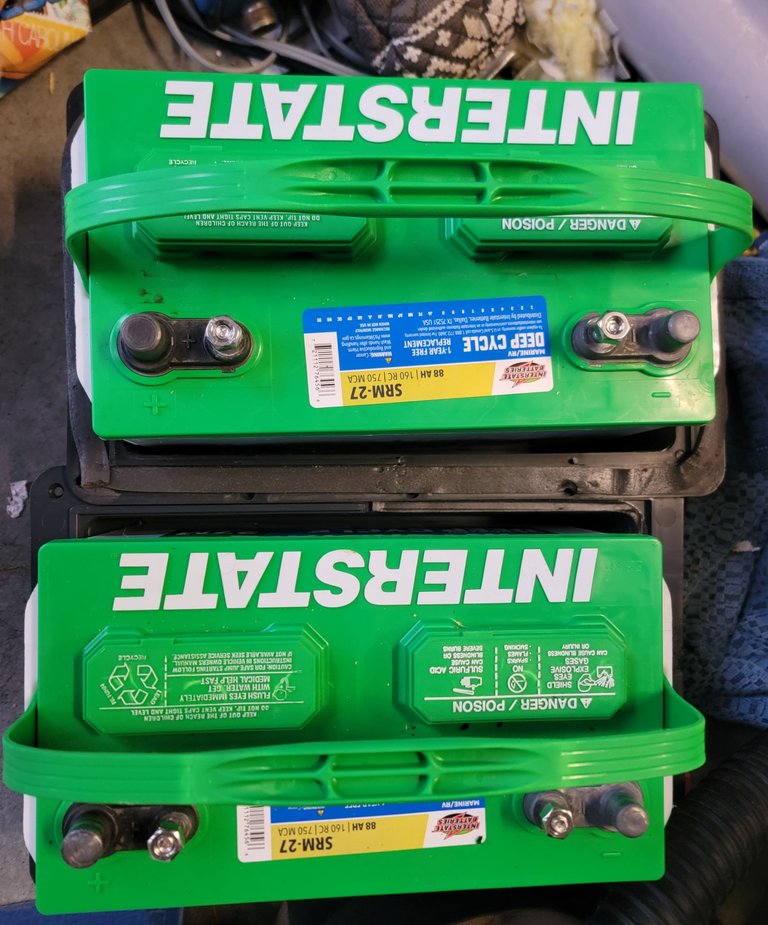Part 1: Bye Bye Lead Acid
When I first bought my trailer, it came equipped with two 88 Amp-Hour deep cycle lead-acid batteries. These batteries are connected in parallel, effectively providing a total of 176 Amp-Hours of capacity. However, in practical terms, you should only consider using 44 Amp-Hours from each battery, totaling 88 Amp-Hours. This is because discharging lead-acid batteries beyond 50% of their capacity can significantly shorten their lifespan and degrade their performance.
Lead-acid battery technology, despite being very old, remains the standard in travel trailers. These batteries have been in use for over a century, dating back to their invention in the mid-1800s. They are relatively inexpensive and widely available, which contributes to their continued use in the RV and marine industries. However, they come with several significant drawbacks:
Weight: Lead-acid batteries are extremely heavy due to their lead content. Each battery can weigh between 50 to 70 pounds, making them cumbersome and difficult to handle.
Toxic Gases: When charging, lead-acid batteries release hydrogen gas, which is highly flammable and can be hazardous if not properly vented. This gas buildup requires the batteries to be installed in a well-ventilated area to prevent the risk of explosion or fire.
Maintenance: These batteries require regular maintenance, including checking the water levels and ensuring the terminals are clean and corrosion-free. Failure to maintain them properly can lead to reduced battery life and efficiency.
Environmental Impact: Lead-acid batteries contain toxic materials such as lead and sulfuric acid, which can be harmful to the environment if not disposed of correctly. Recycling programs are essential to mitigate this impact, but improper disposal can lead to soil and water contamination.
Performance Limitations: Lead-acid batteries have a relatively low energy density compared to newer battery technologies. This means they store less energy per unit of weight and volume. They also have a limited cycle life, typically between 300 to 500 charge-discharge cycles before their capacity is significantly reduced.
Despite these drawbacks, lead-acid batteries remain popular due to their cost-effectiveness and reliability. However, many RV owners are now looking into modern alternatives like lithium-ion batteries, which offer higher energy density, longer lifespan, lighter weight, and no toxic gas emissions, albeit at a higher upfront cost.

These Puppies Are Gone!
Thanks for reading!
Note: I wrote the initial paragraphs for each section and then enhanced them with the help of ChatGPT.
Make sure you use the LiFePO4 Lithium Iron Phosphate type which is much less likely to catch fire and you will be very happy.
Prices have dropped so much on Lithium batteries and they have 10x or more the cycle life of lead acid so they are actually far cheaper over the long run.
Just wait for part 2! :-)
Thanks for dropping by!
Seriously bro Lead-acid batteries are tough to manage from what I'm seeing. They're heavy and need a lot of care. Have you thought about upgrading to lithium-ion though? Perhaps that could help although I'm no expert at all !LOLZ
I've thought about it, in part 2!
That would be epic, I've got you on my favorite author list so definitely won't miss the part 2, can't wait brother
Sweet gear. Hope you are doing well.
!discovery 23
Thanks bro, nice to hear from you!
This post was shared and voted inside the discord by the curators team of discovery-it
Join our Community and follow our Curation Trail
Discovery-it is also a Witness, vote for us here
Delegate to us for passive income. Check our 80% fee-back Program